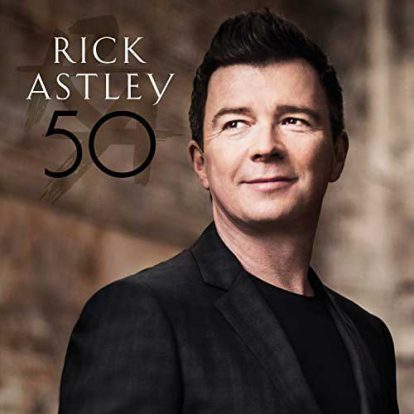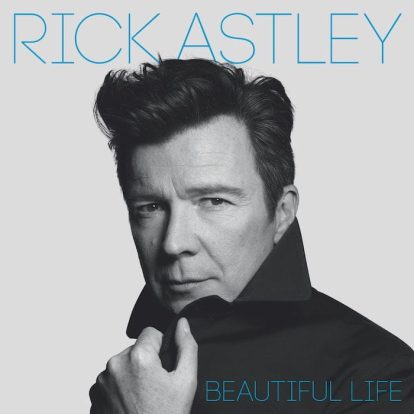
Rick Astley, 2018
He famously retired at 27 but Rick Astley was never seriously gonna give pop up. In 2016, Lancashire’s favourite son returned to toast a milestone birthday with an album simply titled, 50. Two years after that, we spent a balmy summer’s afternoon with the modest star… By Rudy Bolly
Two years ago, when Rick Astley announced his return to planet pop with 50, his first studio album in over a decade, few could have predicted such a strong comeback.
The album “incredibly” – his word not ours – sold more than 300,000 copies on its way to No.1, landing him his first platinum-selling album in 28 years.
Eighteen months of promotion and touring followed before Rick caught his breath and reflected: “Did that really happen?”
Back at his home studio, Rick set out to prove to himself, and the world, that 50 was no fluke. His next, Beautiful Life, is a musical celebration of his rise from the ashes as he also tackles personal demons.
That chart-topping album, forged without the assistance of old pals PWL, still smoulders while yet another self-produced opus is ready to go, along with global tour dates booked for the next 12 months.
“You have to find a way to live that beautiful life and I certainly have these last two years,” notes the singer, basking in a sun-kissed booth at Ronnie Scott’s club in London. At the same time, he is taking nothing for granted.
“Even though we had this amazing success with 50, I went back into the studio with trepidation and thought: ‘How do I do that again?’ I’d made 50 with no expectations whatsoever but with this one, I kind of knew somebody might hear it.”
As with 50, Rick wrote, recorded and produced Beautiful Life by himself, seeing it as an opportunity to learn from previous mistakes.
“I did some lyrical things on the last album which I might not have said,” he confesses. “I was doing it completely subconsciously. The opening lines to the song Keep Singing are about my dad having a bit of a meltdown in the car when I was a young lad.
“It just came out of me one day when I was sat at the piano and arrived fully formed. My mum and dad went through a terrible divorce and, as kids, we experienced it. If I’d known I would be on BBC’s The One Show singing about it, I might have approached it differently.”
That unfiltered emotion was a major factor in 50’s success, but perhaps the tone of Beautiful Life is a little more ambiguous.
A greater achievement is creating another song collection in just two years, rare in a music industry where artists are encouraged to rinse every last penny from an album.
“We did quite a bit of touring and visited Japan and the States, but it’s not like the record was a worldwide sensation,” he says, downplaying his achievements.
“We did well with it here but to be honest, it was really hard, if not impossible, to get on the radio outside of the UK. In the US, there’s no outlet for it. I get played quite a bit over there but it’s always Together Forever and a bit of Cry For Help.
“In the UK, radio has allowed people to connect with the music and that’s translated into sales, so I started the new album last September, jotted down loads of ideas, then picked my favourites.”
It sounds easy but working totally alone comes with its own issues. “On the one hand, the tracks take no time at all – I don’t have to argue, I just do what comes to me. Other times, you’re stuck and there’s no one to bounce ideas off.” While there’s no prevailing theme, Rick definitely knew what he wanted to achieve.
“Playing the last record live taught me that I’m now 52 and there are people in this world who come to my gigs who are my age, and maybe a little older, and actually want to dance. When I was making the last record, I was pleasing myself but I also didn’t want to seem like I’m 21 again because I’m not.
“But we had two songs – Dance and Angels On My Side – which just got everyone up. The reaction wasn’t a million miles away from my biggest hit, Never Gonna Give You Up. We were blown away, even in the US.”
There’s no denying Beautiful Life’s title track is a dance anthem, and Rick plays guitar in homage to Chic’s disco classics. He nods: “Listen to Chic or Earth, Wind & Fire records – there’s a groove there that will never go out of date. Pharrell Williams proved that with Daft Punk.
“I can sound a bit like Nile Rodgers as long as I’m in a dark room and nobody is looking. I play a bit of everything but I won’t do it live. I couldn’t get on a piano at a gig, that’s for sure, I’d be frightened to death. I’m okay at home because I can just re-record it until I like it.”

Rick Astley, 2018
Dig a little deeper on Beautiful Life and you start to see that he can be a worrier. “Yeah, it’s a kind of warning, about finding your way to enjoying this life or it won’t be beautiful at all. I still struggle with that. I’m a professional Northerner, so if there’s a grey cloud, I will find it.”
One song in particular, a powerful soul anthem titled Every Corner, responds directly to his personal demons.
“That’s about my insecurities,” he confirms. “I think a lot of men go through that thing of thinking one day their partner is going to wake up and realise: ‘I’m just bluffing my way through life’.
“That song is me telling my mind not to play tricks on me and there’s a line where I say I’m not going to turn around to check, I don’t care who she’s talking to, she either loves me or she doesn’t. I’m not going to listen to that little voice saying ‘you’ve got freckles and you’re not that tall.’”
Squeezing through
Since Rick Astley still regards himself an accidental pop star, many of his teenage hang-ups still linger.
“I was an insecure 20-year-old and it made things worse being famous back then. It was an era all about the way you looked and I still don’t know how I squeezed through, if I’m honest. Think back to Duran Duran and Wham!, Nick Kamen or Milli Vanilli and how they looked, how they danced, how they presented themselves – by comparison I didn’t have any of that shit going on. I’ve got red hair for Christ’s sake!
“Whereas now, you look at Adele and it’s great how successful she is, but there’s no way record labels would have entertained someone like that before because she’s not the right size. It just wouldn’t have happened. If you didn’t have the right look or a Pete Waterman going, ‘I can make hits with this kid’, you could forget it.”
It seems perverse to think of Rick Astley lacking confidence during his 80s pomp.
“I’d look at myself on Top Of The Pops and think: ‘Oh my God’. I was not one of the cool, good looking kids at school, so why does having a couple of hits turn me into one of the cool and good looking guys? It doesn’t. Instead it exaggerates your insecurities. I really didn’t get over it until I started going back on stage 10 years ago.”
As his success continued, Rick put himself under even greater scrutiny, with things getting worse when PWL eyed him up for 1987’s hallowed Christmas No.1. Pete Waterman persuaded Rick to sing a cover of the Nat King Cole classic, When I Fall In Love.
“My version didn’t live up to his version,” recalls Rick, still perplexed. “Really? You want me to sing a Nat King Cole song? I didn’t actually say that because it wasn’t my place. But by the time it was done, Pete said, ‘That’s the Christmas No.1, it’s got a be’. Then EMI re-released the original and I was like, ‘Oh my God, now everyone gets to compare them!’”
- Read more: Jason Donovan interview
- Read more: Top 40 Kylie songs
Raising his game
The person who got Rick through the hard times and encouraged his comeback is his wife, Lene Bausager. Now also his manager, she is the inspiration behind one of the highlights on the new album, She Makes Me. “She makes me better than I am, that’s what she does. I raise my game because she has more faith in me than I do.”
Thanks to Lena’s calming influence, Rick seems content with his place in pop history, and he tries to impart some of his knowledge and experience on others. “I don’t know any creative people who haven’t got some self doubt,” he muses.
“I’ve actually given a few talks at an acting school and I was really blunt. I told them they really need to think about why they are doing this. If it’s fame and fortune, that’s great, but be honest enough to know that when you’re alone and looking into the mirror, what have you got? I think one of the reasons I’m doing it again now is it’s a hole that needs filling.
“Simply playing at Wembley isn’t going to fill that, it has to be for the fulfilment of doing what makes you feel good about life. I play drums with friends and get easily as much pleasure rehearsing with them as I do playing massive venues because it’s for the joy of it. If you lose that then you’re knackered.”
It was teenage Rick playing drums in his band FBI that got him signed to PWL in the first place.
“Waterman saw me and I signed a production deal with them but I didn’t really know what I was doing. They had a London studio, so I became what is known as the tape-op and then in six months… ‘Bang!’ they became the biggest producers in the world.”
Before he even got to sing a note for Stock Aitken & Waterman, the shy lad oversaw many of the trio’s early productions.
“It went silly at one point,” he laughs. “Sure, they did a few songs that people have never heard and a few artists that slipped through the net, but not many.
“Labels were just throwing money and artists at them so then they started doing things like Bananarama and I got put on the back burner. I ended up living at the studio, which is where the tea boy story came about.
“I’m happy I did it but I wasn’t at the time. Still, I was in London and it was an amazing time for music. They would make a record in a couple of days then, within weeks, it would be on the radio and No.1. So many studios make records that never see the light of day but I didn’t understand that because every tune went to the top.”
Those really were the halcyon Hit Factory years, a revolving door of household names recording pop classics day after day.
“Most artists would do just one song, like Debbie Harry or Cliff [Richard], because labels knew they were the hottest hitmakers in the world. The only thing that got a bit different was when they did the Dead Or Alive album because they rarely made albums. With Pete, it was just a track or two. Then they did Mel & Kim who had a huge hit, so an album followed, too.”
Talking shop
Astley may have been a bit disgruntled but in hindsight, he had the best of both worlds. “I would go to the pub every night and because I was the artist/tea boy/tape-op, I got to hear all their stories. All the other tape-ops or assistants were bought a pint then had to go to the other side because PWL were going to talk shop.
“They would discuss American records, the drum sounds, the synths, all that analysis about how to get a hit. They never went about the process of writing a song that would just be an album track – it was go for the jugular every single time.”
Eventually, the ‘tea boy’ got his big break, with Stock Aitken & Waterman recording a bespoke anthem for his distinctive baritone on New Year’s Day, 1987. Eight months later, Never Gonna Give You Up went to No.1 and, within a year, the tape-op was a millionaire.
“It was a life changer. It was a flag in the ground for them, too, because it went to No.1 in the US and they hadn’t had that kind of success.” This elevation of PWL to a whole new level perhaps began to skewer the quality of their songs. “They probably overdid it to some degree,” agrees Rick.
“The sound did become a bit one- dimensional, but that’s what they were striving to do when they tore a page out of the Motown handbook. They went out of their way to say they could make a record with anyone, but that was a mistake.
“They even made a record with a journalist to prove they could do it and there was a big stink about it at the time because it was way before the internet or reality TV, so we hadn’t seen anything like that.
“People still wanted their entertainment to be nice and shiny, so didn’t want to see the guy throwing up before he goes on stage. I don’t think people wanted to know if they could make a record with anybody off the street because that spoiled it.”
Ballistic, explosive
Rick was the jewel in PWL’s crown until an Aussie actress called Kylie came along.
“I remember her coming to a radio show especially to say hello because she’d just been signed. I thought that was nice of her then two months later, she’s the UK’s biggest star. Kylie probably did more than me for PWL, but I had two No.1s in the US.”
Both Rick and Kylie are back in the same family again, now over at BMG records.
- Read more: Rick Astley 2020 interview
- Read more: Making Rick Astley’s Whenever You Need Somebody
“We’ve bumped into each other a few times. I sent her congratulations when her latest album went to No.1. I think there’s an element of camaraderie between anybody who was around at that time.
“Like Jason Donovan, we’ve had dinner a few times, because we have that connection. We all certainly went through that ballistic, explosive fame thing.”
In contrast to those early PWL years, Rick’s current album is packed with musical variety that ranges from the Motown-flecked Better Together to the deep and confessional Rise Up.
There’s even a nod to his Northern roots during the emotive Empty Heart thanks to a colliery brass band.
“That’s the one thing I didn’t play on the record,” he chuckles. “Some friends were over from Denmark for their anniversary. Over there you get a brass band to wake you up to celebrate certain anniversaries, so my wife managed to find three guys to play first thing and I eventually got them to play on my record. It’s Northern without going too cloth hat and pies.”
But Rick saved his pièce de résistance for last. The immense gong that bookends The Good Old Days may conjure up memories of 70s TV classic, Kung Fu, but it is in fact a touching ode to Rick’s childhood and the family that inspired his musical tastes.
During the course of the sprawling riff-laden epic, Rick name-checks every significant record that has moved him, most of which are prog rock classics.
“There’s an element of catharsis and every one of those records I mention in that song means something. Yellow Brick Road, say no more, Yellow Taxi, Yellow Submarine – I got into The Beatles because of that album because the other stuff was probably a bit above my head. I mention Camel and Supertramp, the first gigs I went to.
“Without them, I wouldn’t be me. I got lost in records as I’m sure most of us did. I remember lying in bed listening to my brother’s records and they got me through all sorts of things. I would just ignore the real world.”
Rick is a fan, just like the rest of us, and nothing beats that buzz of immersing yourself in personal nostalgia.
“We went to see Rick Wakeman do the Six Wives Of Henry The Eighth at Hampton Court a while ago,” he says excitedly.
“I bought 10 tickets for my brothers, sisters and friends because it represented our youth and we were thrilled. I think most people feel that way about music.
“That emotional side you get to share with friends and family? It’s the same for me – I’ve just been able to go further and make some of my own music.”
Beautiful Life is a deeply personal celebration of Rick’s heritage, although perhaps he’s ready to move on from going every step of the way.
“I’m proud of this album and I had a point to prove but I’m not sure that if I was to make another record, that I would do that again. The luxury of getting a producer and bunch of musicians on board and then listening to the sounds is appealing to me now.”
Photos by Rankin
- Want more from Classic Pop magazine? Get a free digital issue when you sign up to our newsletter!
Classic Pop may earn commission from the links on this page, but we only feature products we think you will enjoy.






